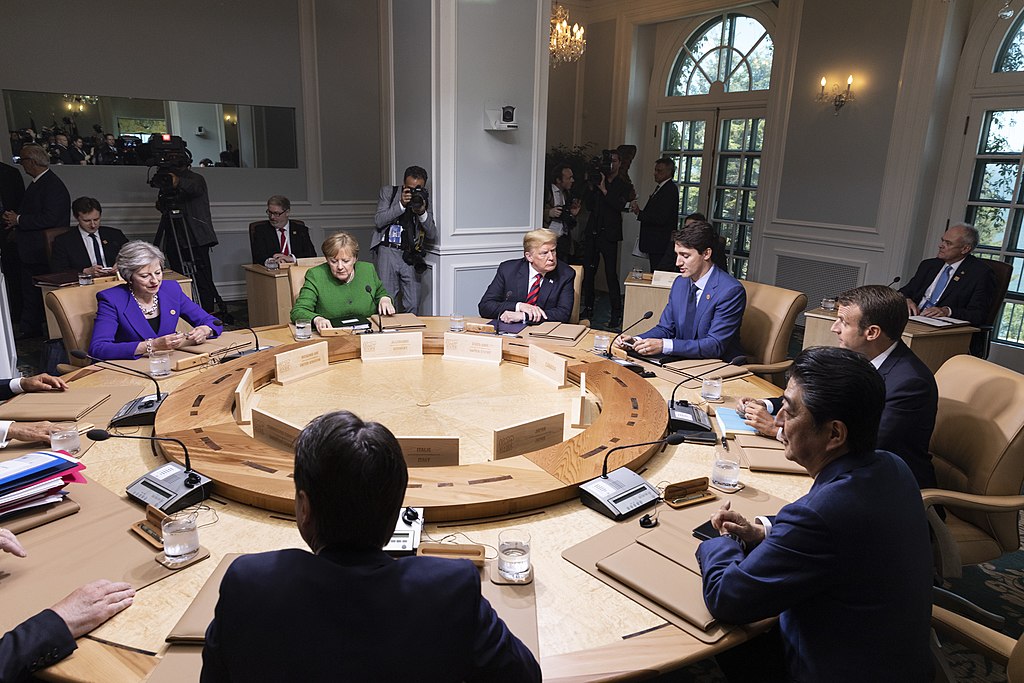Big Gains for Women and Girls at G7

Canada’s G7 presidency might not have made “gender inequality history,” but the Charlevoix summit may still very well be remembered as a milestone for women and girls worldwide.
Gender equality and inclusive economic development were always going to be centerpieces of a Group of Seven (G7) agenda overseen by Prime Minister Justin Trudeau.
It’s 2018 after all, and those priorities are as much a part of the Trudeau brand as fancy socks and sunny ways. But with NAFTA in the lurch, donors feeling fatigued, and at least one G7 partner unwilling to so much as utter the words “climate change” or “sexual and reproductive rights,” success was never going to be easy for a Canadian G7 presidency that prioritized tackling a number of key issues affecting women worldwide.
But despite the bluster and rhetoric, all told, last weekend’s Charlevoix summit mobilized commitments of more than $7 billion CAD to help women and girls in developing countries. This included almost $3.8 billion CAD to improve access and reduce barriers to education for women and girls in crisis settings. G7 development finance institutions will invest another $3 billion USD to stimulate business activities benefitting women entrepreneurs and workers.
For a grouping of countries that has tended to avoid hard financial pledges in the years following the financial crisis, this was a strong demonstration of G7 unity and commitment in support of women and girls’ rights and socio-economic inclusion.
While there is no better way to tell a government’s true intentions than to look at where it puts its money, the G7 is essentially a forum for world leaders to discuss common priorities and set new trends for tackling global issues. On policy leadership that will affect the lives of women and girls on the front lines of conflict, natural disaster and climate change, Canada’s G7 earns top marks. Just under a dozen notable commitments, declarations and blueprints have been adopted by G7 ministers and leaders under Canada’s presidency — some featuring actionable steps by which G7 countries can usher in desperately needed changes that could do much to help the world’s most marginalized women and girls.
Prominent among these is the G7 Development Ministers’ Whistler Declaration on Gender Equality and the Empowerment of Women and Girls in Humanitarian Action. In a world characterized by an increasing number of protracted crises, with some 65 million people displaced from their homes and more than 32 million women and girls in need of life-saving humanitarian assistance worldwide, a humanitarian system that has long tended to overlook women and girls’ specific needs and realities is no longer tenable.
The Whistler Declaration includes agreements to pursue gender-based analysis, better data collection, and accountability to affected populations. It also includes clever hooks on some of the more delicate issues. While the declaration fails to mention the Minimum Initial Services Package for Reproductive Health (MISP) — an emerging international standard for supporting women and girls’ access to sexual and reproductive services in crisis settings — for example, it does commit G7 countries to “funding and monitoring the implementation of the full range of internationally-agreed standards of humanitarian health response in crises.”
These and other measures, while not the stuff of flashy political announcements, stand to help usher in a more gender-sensitive system for helping people caught in some of the world’s most inhospitable environments, and to unlock women and girls’ contributions as first responders, community leaders and breadwinners within the overstretched international humanitarian system.
Acknowledging the climate-conflict link
Another important area of agreement between G7 leaders was around building adaptive capacity and resilience against extreme weather events. The imperative for progress in this area could hardly be more compelling, and the strategic choice of language allowed the G7 to have serious discussions about the impacts of climate change in a way that proved acceptable to all G7 countries.
After years of hard-won gains in human and economic development, climate change and severe weather are pushing the world’s most marginalised people to the brink. Climate impact models tell us that the world’s poorest countries already absorb up to 80 percent of the costs of dealing with climate change, including through the devastation of crops by drought or flooding, and the destruction of vital infrastructure. Without urgent and ambitious action, the World Bank estimates that climate change could push an additional 100 million people into extreme poverty by 2030.
Putting the brakes on the slow-moving crisis of climate change is going to be costly, and new tools and sources of capital are needed to help communities get back on their feet when extreme weather causes unexpected setbacks. It is significant in this context — and with climate skeptics represented at the table — that G7 foreign ministers identified climate change as a root cause of conflict, instability and vulnerability.
It is also significant that finance and development ministers agreed on a series of steps to optimize and expand the toolkit for helping poor and vulnerable countries to manage the economic risks of extreme weather events. Ministers agreed on ways to help ensure those tools are not just good for insurance companies and other would-be financiers, but also maximize development and gender equality dividends while helping people overcome climate-induced hardships.
By no means does this let the world’s wealthy countries off the hook for demonstrating how they will fulfill their Paris Agreement pledge to mobilize $100 billion in international climate finance by 2020, with at least half of that directed at helping poor communities adapt to the effects of climate change. Canada’s G7 has so far fallen short on this front, but references to financing resilience and enhancing adaptive capacity in the Charlevoix communiqué give hope that G7 environment ministers could yet deliver when they meet in October.
“Canada made a point of drawing the G7 out of its ivory tower to ensure its discussions were informed by some of the very people they are most likely to affect.”
Canada’s G7 presidency has also been unique in its approach. From the establishment of a Gender Equality Advisory Council to engagement with contact groups representing women, youth and civil society (known as the W7, Y7 and C7), Canada made a point of drawing the G7 out of its ivory tower to ensure its discussions were informed by some of the very people they are most likely to affect.
By the reckoning of many multilateral institutions today, international governance is in the throes of a “participation revolution,” but few bold steps have been taken to demonstrate what that might look like in practice. So it is laudable that Canada’s G7 presidency took important steps to do things differently, through open online consultations on the shape and substance of the G7 agenda, for example, and by inviting adolescent girls from around the world to participate in the development ministers’ meeting.
History shows that emerging crises almost always take over discussions at G7 leaders’ summits. Given the trade barbs before and after the summit, Charlevoix may go down as the archetype of that truism. Look beyond the theatre and between the lines of the carefully crafted communiqué and ministerial declarations, however, and a picture emerges of numerous compromises made over language, in order to preserve the substance within.
Canada’s G7 presidency may not have fulfilled the Gender Equality Council’s bold call to “make gender inequality history,” but it did provide some important nudges in the direction of a more gender-equitable and inclusive international order. If these elements can be sustained and built upon in ways that promote mutual accountability and follow-through, Charlevoix may well be remembered as a milestone for women and girls worldwide, and for the modern-day relevance of the G7 itself.
Shaughn McArthur is Advocacy and Government Relations Advisor for CARE Canada.
This article was first published in OpenCanada.org on 14 June 2018 and is reprinted with permission.





